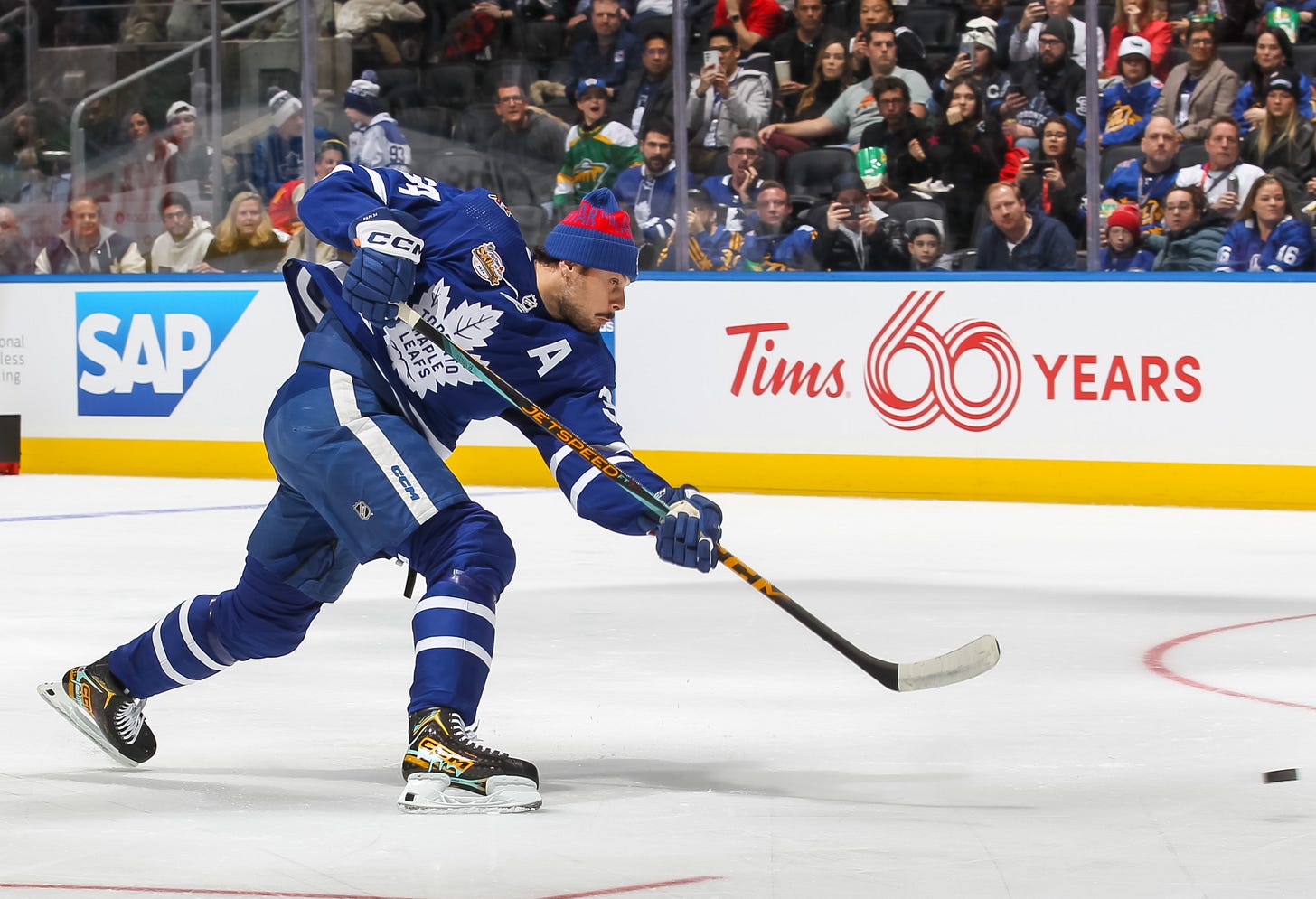Auston Matthews Is Having One of the NHL’s Greatest Goal-Scoring Seasons
We haven't seen somebody light the lamp like the Maple Leafs' star in more than 30 years.

It’s a little hard to remember now, during the NHL’s return to mid-90s-style scoring levels,1 but goals used to be a bit difficult to come by across the league. As recently as 2014-15, nobody eclipsed 90 points — much less 100 — in a full season. In 2017-18, a full schedule produced zero 50-goal scorers. So when Auston Matthews broke the 60-goal barrier in 2021-22, the first time anybody got to that threshold since Steven Stamkos in 2011-12, us fans old enough to remember Mario Lemieux and Pavel Bure burning up the nets 25 years earlier were happy.
Did we think, however, that someone would start eyeing 70 goals (or more) in the near future? Considering that had only happened 14 times in all of NHL history, and just once outside the high-flying 11-year period between 1982 and 1993, it didn’t seem likely.
Yet, that’s exactly what Matthews is doing right now. With 49 goals in the Toronto Maple Leafs’ first 54 games of the schedule, he is on pace for 74.4 goals by year’s end. He’s been scoring above a 70-goal pace for most of the season (since mid-December), and has recently begun to consistently challenge the pace necessary for 75 goals:
If he gets there, it would be the eighth-most goals anyone scored in a single campaign, and the most since Alexander Mogilny and Teemu Selänne each scored 76 in 1992-93. (Incidentally, you have to love seeing a super-young Mike Tirico and the classic ESPN SportsCenter graphics in the clip below:)
That would necessitate Matthews scoring 26 goals in his team’s next 28 games, a 0.93 goals per game average he’s never achieved in a season and has only done a few times in any 28-game span of his whole career. (Granted, he’s actually currently on a career-best heater of 30 goals in the past 28 games, which would land him at nearly 80 goals by season’s end.) But even if he settles for 70, which would require a more modest and achievable 21 goals in the next 28 games (or 0.75 goals per game, a rate he’s hit in three of the past four seasons), that would leave Matthews tied for 12th on the NHL’s all-time single-season goals leaderboard, in a club that hasn’t been joined since 1993.
And one could make a strong argument that, given the disparity that still exists between the offensive environments of 2023-24 and the 1980s/early ‘90s, Matthews is in the middle of one of history’s greatest goal-scoring seasons ever.
Some of my favorite tools for cross-era NHL comparisons are Hockey-Reference’s Adjusted Statistics. In a nutshell, they work by taking a player’s base numbers and normalizing them to a neutral historical season of 82 games per team and 6 goals per game across both teams.2 If we look at Matthews’ Adjusted Goals, he is on pace for 74 this season, since the 2023-24 league average is only about 6.2 goals per game for both teams (yielding only a slight era adjustment).
After accounting for the elevated scoring environments of eras like the 1980s, only one season in NHL history — Brett Hull’s 86-goal output from 1990-91, which translates to 78 Adjusted Goals — has been greater than the pace Matthews currently finds himself on:
Of course, he’ll have to maintain the same pace to keep it up — or elevate his output even more to surpass the Golden Brett. But Matthews is currently ahead of the greatest years ever produced by Wayne Gretzky (whose record 92-goal campaign from 1982 is downgraded to “just” 68 Adjusted Goals — sorry, Wayne) or Lemieux (whose 85 goals from 1989 are similarly downgraded to just 71). Through this lens, the recent player whose goal-scoring output most resembles Matthews’ is Alex Ovechkin, which makes a lot of sense based on the comparisons between the pair over the years.
Matthews has a lot more than these scoring milestones to worry about. He is building an MVP case and the Leafs are vying for that ever-elusive first Stanley Cup since 1967, when Gretzky, Lemieux and Hull were all just wee lads. (Toronto beat Hull’s dad along the path to that Cup, coincidentally enough.) But amidst all of that, we should also sit back and appreciate the goal-scoring greatness we’re watching with Matthews right now. It’s something we haven’t seen in decades — and, for a long time, we weren’t sure we would ever see in the NHL again.
Filed under: NHL, Statgeekery
Which is obviously the best scoring level for the NHL to have, because everything was in its most perfect and natural state when I happened to be 10 years old. It’s funny how that just coincidentally worked out!
There are also roster-size adjustments for earlier eras in which teams dressed fewer skaters, which meant inflated ice-time numbers for top players, but we don’t need to worry about that adjustment in Matthews’ case.




